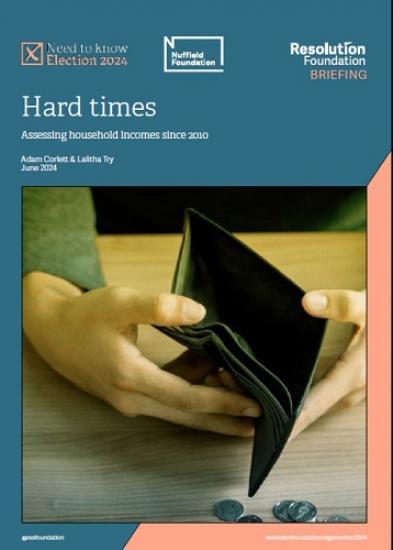Current Parliament Remains On Track To Be The Worst For Living Standards Growth Since The 1950s
29th June 2024

Real per capita household disposable incomes were lower in early 2024 than they were back in late 2019, with growth so far in this parliament weaker than all but two parliaments since 1910, the Resolution Foundation said on Friday 28 June 2024 in response to the latest ONS National Accounts data.
The Foundation notes that real per capita household disposable incomes (RHDI) has grown over the past year, by 2.4 per cent, as Britain has emerged from the depths of the cost-of-living crisis.
However, Britain's record over the parliament as a whole remains very weak. Between Q4 2019 and Q1 2024, RHDI has fallen by 0.6 per cent, or 0.1 per cent a year on average, leaving average incomes £120 a year lower per person over the whole period since the last election.
Resolution Foundation analysis of ONS and Bank of England data shows that the current parliament has been historically weak for living standards. If future data confirms that incomes are lower at the time of the upcoming election than in late 2019, that drop would be the first such fall since the 1950-51 parliament, and only the third since 1910.
The 1918-1922 parliament, when Britain was gripped by the Spanish Flu, saw RHDI per capita fall by an estimated 8 per cent, while the short 1950-1951 parliament, when inflation spiked as a result of rapid rearmament for the Korean War, saw RHDI per capita fall by roughly 1 per cent.
The Foundation notes that external shocks have driven down incomes over the current parliament, with Covid-19 and the cost-of-living crisis affecting the living standards of millions of families across many economies.
However, Resolution Foundation research published today also shows that Britain's great living standards slowdown predates the pandemic and goes all the way back to the financial crisis. Since 2010, typical real non-pensioner household disposable incomes have grown by just 0.5 per cent a year on average.
Adam Corlett, Principal Economist at the Resolution Foundation, said:
"The last five years have been terrible for living standards growth. Disposable incomes in early 2024 were still lower than they were at the 2019 election, by around £120 per person. Income growth over the parliament so far has been worse than in any other since the 1950s, and the third worst in post-Edwardian Britain.
"Britain is far from alone in experiencing a tough five years - many other countries have been badly affected by Covid-19 and the cost-of-living crisis straight after that. But Britain's longer-term record on growth is also weak and we remain poorer than many of our peers. Addressing this great living standards slowdown is the ultimate test for whomever wins the election."
This briefing note is part of the Resolution Foundation's ‘Need to Know Election 2024' series and examines how income growth, poverty and inequality have changed over the last Parliament and since 2010.
At the General Election, living standards growth should be on the agenda for any party wishing to form the next government. This is because income growth since 2009-10 has been particularly low, with typical non-pensioner household incomes growing by just £1,900, or £140 per year. Our income growth has also been weak by international standards: had we experienced the same level of growth in median incomes between 2007 and 2022 as the Netherlands, France and Germany, the UK's median income in 2022-23 would be £2,700 higher than actually observed. The income growth we have had over this period has been progressive, but less progress has been made on bringing down poverty rates than in previous time periods.
These findings reinforce previous Resolution Foundation research on the UK's stagnating economy and high inequality. Whichever party forms the next government must be willing to take steps to boost living standards, so all families in the UK can experience shared growth.
Key findings
Real household disposable income (RHDI) was 0.6 per cent lower in Q1 2024 (the latest data at the time of the last General Election) than it was in Q4 2019. Although there is still more data to be released before we can conclusively assess progress up to the 2024 election, it is likely that the 2019-2024 Parliament will have been the worst for income growth since at least the 1950s.
Taking a longer view, typical non-pensioner incomes have grown since 2009-10, by £1,900, or 7 per cent. But again, this level of income growth - equivalent to an average annual real-terms change of 0.5 per cent, or £140 a year - is unusually low by historical standards. And had we experienced the same level of growth in median incomes between 2007 and 2022 as the Netherlands, France and Germany, the UK's median income in 2022-23 would be £2,700 higher than actually observed.
It is changes in the labour market since 2010 that have really driven the income growth for low-income households. Employment gains have been concentrated at the bottom of the income distribution, pay inequality has fallen, and the incidence of low pay considerably reduced since the introduction of the NLW (National Living Wage).
Over the last 14 years, absolute poverty (where the poverty line is fixed at 60 per cent of the 2010 median income in real terms) has fallen for all age groups, by 3.9 percentage points (230,000 people) for children, 3.9 percentage points (730,000) for working-age adults, and by 2.8 percentage points (280,000) for pensioners. But this is very slow progress by historical standards.
The picture concerning relative poverty is more mixed: working-age relative poverty has fallen since 2009-10, but this has been partially offset by slightly higher relative poverty rates for children and pensioners. This increase in child poverty has been driven by the rapidly rising number of children in large families living in poverty: since 2009-10, the number of children in poverty in families with three or more children has risen by 840,000.
Download full report HERE
